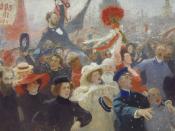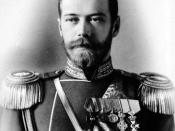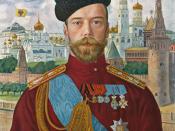The revolutionary events in Russia in 1917 stemmed from a number of causes but the primary one was the tyranny of the Tsar. The unfair and cruel use of power by the Tsar to satisfy himself and furthermore ignore the needs and the demands of the Russian people in particularly the peasants and the workers would later become the downfall of his autocracy.
Russia had been experiencing a number of problems in the years leading up to World War I which created an environment suited to revolution. For many years the peasants of Russia had faced growing problems in terms of achieving their desire to own their own land and financial success through agriculture. As a result, many had move into the cities in the hope of finding work in the expanding industrial world. However they often found that both working and living conditions were terrible. Little concern was shown by the Tsar for the workers health and safety which produced a strong urgency by many to find solutions to their poor living standards.
In 1904 Russia fell into war with Japan and lost. Domestically, the industrial works began to suffer because of strikes and the loss of services such as electricity. Although the people asked for Nicholas to grant them an elected parliament and constitution it was denied and led to "Bloody Sunday" which was the start of the year of protests, strikes and murders. While it led Nicholas to promise change and to sign the October Manifesto, this only happened in order to avoid revolution.
The problem to follow from this and reach right through to 1917 was that Nicholas did not mean his promises and in fact created responses which included repression and led to serious changes in the peasant's attitude to Nicholas. As people came...



Good job!
i think you did a great job, i never knew that before!!!
1 out of 1 people found this comment useful.